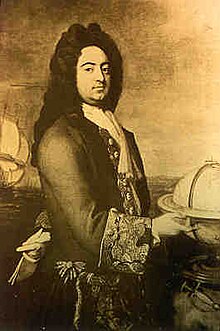Francis Nicholson
| Francis Nicholson | |
|---|---|
 |
|
| Governor of the Province of Maryland | |
|
In office 1694–1698 |
|
| Preceded by | Thomas Lawrence |
| Succeeded by | Nathaniel Blakiston |
| Lieutenant Governor of the Colony and Dominion of Virginia | |
|
In office 1698–1705 |
|
| Preceded by | George Hamilton |
| Succeeded by | Edward Nott |
| Governor of Nova Scotia | |
|
In office 1712–1715 |
|
| Monarch |
Anne George I |
| Preceded by | Samuel Vetch |
| Succeeded by | Samuel Vetch |
| Governor of the Province of South Carolina | |
|
In office 1721–1725 |
|
| Preceded by | James Moore II |
| Succeeded by | Arthur Middleton |
| Personal details | |
| Born | 12 November 1655 Downholme, Yorkshire |
| Died | 5/16 March 1727/28 London |
| Religion | Anglican |
| Signature | |
| Military service | |
| Allegiance |
|
| Rank | Lieutenant-General |
| Battles/wars | |
Monmouth Rebellion
Queen Anne's War
Francis Nicholson (12 November 1655 – March 16, 1728 [O.S. March 5, 1727]) was a British military officer and colonial administrator. His military service included time in Africa and Europe, after which he was sent as leader of the troops supporting Sir Edmund Andros in the Dominion of New England. There he distinguished himself, and was appointed lieutenant governor of the dominion in 1688. After news of the Glorious Revolution reached the colonies in 1689, Andros was overthrown in the Boston Revolt. Nicholson himself was soon caught up in unrest in New York, and fled to England.
He next served as lieutenant governor or governor of Virginia and Maryland. He supported the founding of the College of William and Mary, and quarreled with Andros after Andros was selected over him as governor of Virginia. In 1709 he became involved in colonial military actions during Queen Anne's War, leading an aborted expedition against Canada. He then led the expedition that successfully captured Port Royal, Acadia on 2 October 1710. Afterward he served as governor of Nova Scotia and Placentia, and was the first royal governor of South Carolina following a rebellion against its proprietors. He rose to the rank of Lieutenant-General, and died a bachelor in London in 1728.
...
Wikipedia
